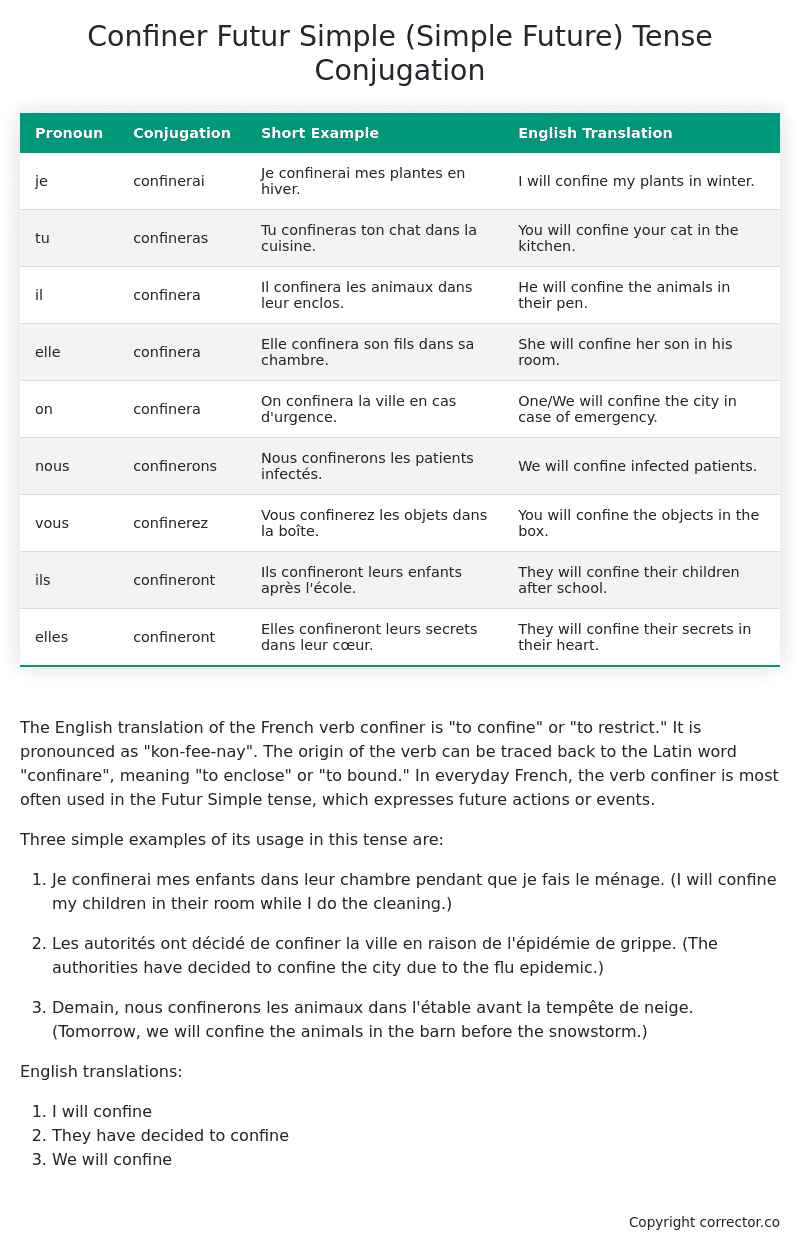Futur Simple (Simple Future) Tense Conjugation of the French Verb confiner
Introduction to the verb confiner
The English translation of the French verb confiner is “to confine” or “to restrict.” It is pronounced as “kon-fee-nay”. The origin of the verb can be traced back to the Latin word “confinare”, meaning “to enclose” or “to bound.” In everyday French, the verb confiner is most often used in the Futur Simple tense, which expresses future actions or events.
Three simple examples of its usage in this tense are:
-
Je confinerai mes enfants dans leur chambre pendant que je fais le ménage. (I will confine my children in their room while I do the cleaning.)
-
Les autorités ont décidé de confiner la ville en raison de l’épidémie de grippe. (The authorities have decided to confine the city due to the flu epidemic.)
-
Demain, nous confinerons les animaux dans l’étable avant la tempête de neige. (Tomorrow, we will confine the animals in the barn before the snowstorm.)
English translations:
- I will confine
- They have decided to confine
- We will confine
Table of the Futur Simple (Simple Future) Tense Conjugation of confiner
| Pronoun | Conjugation | Short Example | English Translation |
|---|---|---|---|
| je | confinerai | Je confinerai mes plantes en hiver. | I will confine my plants in winter. |
| tu | confineras | Tu confineras ton chat dans la cuisine. | You will confine your cat in the kitchen. |
| il | confinera | Il confinera les animaux dans leur enclos. | He will confine the animals in their pen. |
| elle | confinera | Elle confinera son fils dans sa chambre. | She will confine her son in his room. |
| on | confinera | On confinera la ville en cas d’urgence. | One/We will confine the city in case of emergency. |
| nous | confinerons | Nous confinerons les patients infectés. | We will confine infected patients. |
| vous | confinerez | Vous confinerez les objets dans la boîte. | You will confine the objects in the box. |
| ils | confineront | Ils confineront leurs enfants après l’école. | They will confine their children after school. |
| elles | confineront | Elles confineront leurs secrets dans leur cœur. | They will confine their secrets in their heart. |
Other Conjugations for Confiner.
Le Present (Present Tense) Conjugation of the French Verb confiner
Imparfait (Imperfect) Tense Conjugation of the French Verb confiner
Passé Simple (Simple Past) Tense Conjugation of the French Verb confiner
Passé Composé (Present Perfect) Tense Conjugation of the French Verb confiner
Futur Simple (Simple Future) Tense Conjugation of the French Verb confiner (this article)
Futur Proche (Near Future) Tense Conjugation of the French Verb confiner
Plus-que-parfait (Pluperfect) Tense Conjugation of the French Verb confiner
Passé Antérieur (Past Anterior) Tense Conjugation of the French Verb confiner
Futur Antérieur (Future Anterior) Tense Conjugation of the French Verb confiner
Subjonctif Présent (Subjunctive Present) Tense Conjugation of the French Verb confiner
Subjonctif Passé (Subjunctive Past) Tense Conjugation of the French Verb confiner
Subjonctif Imparfait (Subjunctive Imperfect) Tense Conjugation of the French Verb confiner
Subjonctif Plus-que-parfait (Subjunctive Pluperfect) Tense Conjugation of the French Verb confiner
Conditionnel Présent (Conditional Present) Tense Conjugation of the French Verb confiner
Conditionnel Passé (Conditional Past) Tense Conjugation of the French Verb confiner
L’impératif Présent (Imperative Present) Tense Conjugation of the French Verb confiner
L’infinitif Présent (Infinitive Present) Tense Conjugation of the French Verb confiner
Struggling with French verbs or the language in general? Why not use our free French Grammar Checker – no registration required!
Get a FREE Download Study Sheet of this Conjugation 🔥
Simply right click the image below, click “save image” and get your free reference for the confiner Futur Simple tense conjugation!

Confiner – About the French Futur Simple (Simple Future) Tense
Formation of Futur Simple
For regular -er verbs (e.g., parler – to speak)
For regular -ir verbs (e.g., finir – to finish)
For regular -re verbs (e.g., vendre – to sell)
Common Everyday Usage Patterns
Conditional Statements
Interactions with Other Tenses
Futur Antérieur
Conditional
Present
Summary
I hope you enjoyed this article on the verb confiner. Still in a learning mood? Check out another TOTALLY random French verb conjugation!


